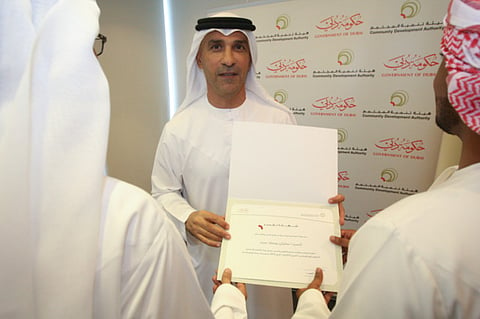There’s life after drugs, Dubai former addict says
Salman is bent on getting his life back on track after losing 12 years to substance abuse

Dubai: Twenty-nine-year old Salman tried to kill himself three times when he was high on drugs and overcome by depression. Now fully recovered, he’s picking up the pieces to tell others that there’s life after substance abuse.
“I tried to kill myself when I was 18, but failed. Then I tried again at 22, but failed again. My last attempt was at 25. I tried hanging myself, cutting my veins and burning myself — all because I was high and depressed,” Salman (full name withheld upon request) told Gulf News.
Salman was one of the two graduates of Dubai’s social rehabilitation centre called ‘Ownak’ (Arabic for ‘Your Support’) on Monday. Salman and another former drug addict, Abdullah, were the first batch of graduates to complete a four-month therapy and training course at the centre under the Community Development Authority (CDA).
Salman was in Grade 8 when he started using drugs out of curiosity, after seeing his peers smoke hashish. In no time, his addiction progressed.
“I was on hashish, heroin, different kinds of tablets, ecstasy, and cocaine,” Salman said. “I was always on drugs; I always high.”
Life took a different turn when he was imprisoned for substance abuse. It was inside prison that he realised that he had lost 12 years of his life to drugs.
Salman participated in rehabilitation programmes by Dubai government and finally turned his back on drugs in 2010.
“Alhamdulillah! I am lot different now. The old Salman was born in December 1984. The Salman you’re seeing now was born on March 1, 2010 — the day I decided to quit drugs totally to regain my life.”
Family problems
Salman said he would dedicate his new life in reaching out to former drug addicts. “I want to encourage them to stay strong in their fight against drugs — to tell them that there’s life after drugs.”
Based on CDA figures released in 2013, the number of young Emiratis who could later become drug abusers could increase from 387 to 561 within the next nine years if an intervention is not carried out.
Currently, Ownak is handling 46 former drug dependents to prepare their reintegration into society. But this is just part of a comprehensive solution, Khalid Al Kamdah, CDA Director-General, said.
“We recently submitted a proposal to the Executive Council to establish a National Rehabilitation Centre based in Dubai that will focus on three stages of rehabilitation from treating drug addicts to socially rehabilitating them,” Al Kamdah told Gulf News.
A multi-pronged approach is needed to ensure reformed individuals can rejoin the community without conflicts. This can be done by conducting family therapies alongside former drug dependents, which the CDA is also doing through Ownak.
“When we talk about Ownak we talk about a person who had a history of drug addiction. He does not come from a family that doesn’t have a problem. Usually the family has other issues, whether education or financial problems or a lack of a proper way of raising children,” Dr Hussain Maseeh, Social Programme and Services Expert at the CDA, told Gulf News.
“We cannot treat a person with addiction and put them back into a system that’s already problematic. So to save resources and have proper results, we deal with the person with the addiction and the family to have a better outcome,” he added.
Sign up for the Daily Briefing
Get the latest news and updates straight to your inbox


